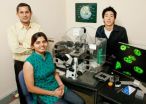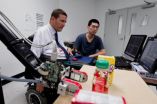(Press-News.org) CHAMPAIGN, Ill. — Researchers report this month that MALAT1, a long non-coding RNA that is implicated in certain cancers, regulates pre-mRNA splicing – a critical step in the earliest stage of protein production. Their study appears in the journal Molecular Cell.
Nearly 5 percent of the human genome codes for proteins, and scientists are only beginning to understand the role of the rest of the "non-coding" genome. Among the least studied non-coding genes – which are transcribed from DNA to RNA but generally are not translated into proteins – are the long non-coding RNAs (lncRNAs).
Before the human genome was fully sequenced, it was a "protein-centric world," said University of Illinois cell and developmental biology professor Kannanganattu Prasanth, who led the study. With the sequencing of the genome it became clear, however, that a majority of genes code for RNAs that are not translated into proteins.
In recent years, research on non-coding RNAs has blossomed, but most studies have focused only on small non-coding RNAs, which play critical roles in several aspects of cellular function. There have been comparatively fewer studies on lncRNAs, Prasanth said. As a result, researchers are only beginning to understand the functions of a few lncRNAs.
Prasanth's laboratory focuses on understanding the role of lncRNAs, such as MALAT1, which normally are distributed in the nucleus of mammalian cells.
Preliminary studies suggest that lncRNAs carry out vital regulatory functions in cells. When those functions go awry, Prasanth said, serious consequences can result. Abnormal expression of the MALAT1 gene, for example, is implicated in many cancers, including breast, lung and liver cancers, "so the scientific world was interested in what this RNA could be doing in normal cells, and how changes in its expression correlate with cancer," he said.
Prasanth was also the co-first-author of another study, recently published in The EMBO Journal, that found that MALAT1 plays a role in recruiting important proteins, called pre-mRNA splicing factors, to the site of gene transcription in the nucleus.
Pre-mRNA splicing involves cutting out unneeded sequences and piecing the mRNAs together before they are exported from the nucleus and translated into proteins.
"That study gave us the clue that MALAT1 is an important gene that might be involved in pre-mRNA metabolism," Prasanth said.
In the new study, Prasanth and his colleagues tested the hypothesis that MALAT1 interacts with and modulates the behavior of a group of pre-mRNA splicing factors known as the SR-family splicing factors.
The researchers found that the MALAT1 sequence contains multiple regions that can bind SR-splicing proteins. Further experiments showed that MALAT1 does indeed bind to several members of the SR-proteins the team analyzed.
Furthermore, depleting cells of MALAT1 or over-expressing the splicing factors to which it can bind led to the same alteration in the splicing of a large number of pre-mRNAs in the cells, suggesting that MALAT1 latches onto the splicing factors and regulates their access to new transcripts.
"All of the data strongly suggest that MALAT1 is acting as a regulator of splicing by modulating the levels of the splicing factors in the cell," Prasanth said.
This study verifies that MALAT1 plays a key role in pre-mRNA processing, with broad implications for human health, Prasanth said.
"Numerous studies have shown that aberrant splicing of pre-mRNA is a major issue associated with several diseases, including cancer," he said. "Some of the factors we know interact with MALAT1 have been shown to be oncogenes. If you over-express these genes you can make a cell cancerous."
"Similarly, some of the genes whose pre-mRNA splicing is controlled by MALAT1 are members of the cancer 'signature genes,' " Prasanth said. "This means that their abnormal expression is directly correlated with several cancers."
INFORMATION:
Post-doctoral researcher Vidisha Tripathi led this work, with assistance from undergraduate student David Song. Supriya Prasanth, a professor of cell and developmental biology at Illinois, and her graduate student, Zhen Shen, also contributed to the study. The research team also included scientists from the University of Toronto; ISIS Pharmaceuticals, Carlsbad, Calif.; and Wright State University, Dayton, Ohio.
Editor's notes: To reach Kannanganattu Prasanth, e-mail kumarp@illinois.edu.
Cancer-associated long non-coding RNA regulates pre-mRNA splicing
2010-09-24
ELSE PRESS RELEASES FROM THIS DATE:
GOES-13 sees tropical depression 15 form in the south-central Caribbean Sea
2010-09-24
The fifteenth tropical depression of the Atlantic Ocean season has formed in the south-central Caribbean Sea, and the GOES-13 satellite captured its swirling mass of clouds and showers in a visible image today. Watches and warnings are already up for Central America.
At 2 p.m. EDT today, Sept. 23, Tropical Depression 15 had maximum sustained winds near 35 mph. It was located about 485 miles east of Puerto Cabezas, Nicaragua, near 13.9 North and 76.2 West. It was moving west at 15 mph, and had a minimum central pressure of 1007 millibars.
The government of Nicaragua ...
NASA sees important cloud-top temperatures as Tropical Storm Malakas heads for Iwo To
2010-09-24
NASA's Aqua satellite has peered into the cloud tops of Tropical Storm Malakas and derived just how cold they really are, giving an indication to forecasters of the strength of the storm.
The Atmospheric Infrared Sounder instrument, known as AIRS has the ability to determine cloud top and sea surface temperatures from its position in space aboard NASA's Aqua satellite. Cloud top temperatures help forecasters know if a storm is powering up or powering down.
When cloud top temperatures get colder it means that they're getting higher into the atmosphere which means the ...
NASA satellites help see ups and downs ahead for Depression Lisa
2010-09-24
Tropical Depression Lisa has had a struggle, and it appears that she's in for more of the same.
Infrared satellite imagery from the Atmospheric Infrared Sounder (AIRS) instrument on NASA's Aqua satellite shows that the convection (rapidly rising air that forms thunderstorms that make up a tropical cyclone) is increasing in Lisa. The convection is becoming a little better organized and stronger which is will make for some heavy rainfall over the northwestern Cape Verde Islands. It's also an indication that she may be strengthening back into a tropical storm today.
That ...
Team of researchers finds possible new genetic risk for Alzheimer's disease
2010-09-24
Researchers have identified a gene that appears to increase a person's risk of developing late-onset Alzheimer's disease, the most common form of the disease. The gene, abbreviated as MTHFD1L, is on chromosome six, and was identified in a genome-wide association study. Details are published September 23 in the journal PLoS Genetics.
The collaborative team of researchers was led by Margaret A. Pericak-Vance, PhD, Director of the John P. Hussman Institute for Human Genomics at the University of Miami Miller School of Medicine; Joseph D. Buxbaum, PhD, Department of Psychiatry, ...
Earth: Fixing Pakistan's water woes
2010-09-24
Pakistan is facing tremendous water issues. This summer's flooding has left millions of people without homes and without access to clean drinking water. But water issues - both quantity and quality - are not new to this strategically important country. Waterborne diseases account for 30 percent of all deaths in Pakistan, and kill some 250,000 children each year. Per capita water availability in Pakistan is less than one-ninth of what it is in the U.S. And what's more, researchers say if Pakistan doesn't manage its water resources differently, it's going to actually run ...
Robotic arm's big flaw: Patients say it's 'too easy'
2010-09-24
One touch directs a robotic arm to grab objects in a new computer program designed to give people in wheelchairs more independence.
University of Central Florida researchers thought the ease of the using the program's automatic mode would be a huge hit. But they were wrong – many participants in a pilot study didn't like it because it was "too easy."
Most participants preferred the manual mode, which requires them to think several steps ahead and either physically type in instructions or verbally direct the arm with a series of precise commands. They favored the manual ...
Black motorcyclists -- even in helmets -- more likely to die in crashes
2010-09-24
African-American victims of motorcycle crashes were 1.5 times more likely to die from their injuries than similarly injured whites, even though many more of the African-American victims were wearing helmets at the time of injury, according to a new study by Johns Hopkins researchers.
Results of the research revealing these racial disparities, published in the August issue of the American Journal of Surgery, suggest that injury-prevention programs — like state laws mandating the use of motorcycle helmets — may not be sufficient to protect all riders equally.
"For reasons ...
Withering well can improve fertility
2010-09-24
Contrary to a thousand face cream adverts, the secret of fertility might not be eternal youth. Research by the ecologist Dr. Carlos Herrera, a Professor of Research at the Consejo Superior de Investigaciones Científicas in Seville, Spain has shown that the withering action of flowers may have evolved to protect their seeds. His research is published in the October 2010 issue of the Annals of Botany (http://dx.doi.org/10.1093/aob/mcq160).
Prof. Herrera said: "No one has paid much attention to the corollas, collections of petals on a flower, when they shrivel. Their job ...
One of a Kind Comic Art Painting Exclusively for Sale on Sketch Maven for a Limited Time
2010-09-24
Comic collectors and art aficionados have the opportunity to acquire a unique piece of cartoon art history. This week, Sketch Maven is offering a tremendous piece of cartoon artwork featuring the characters of Moon Mullins, one of the longest running comic strips in American history.
"This is beautiful artwork by Ferd and Tom Johnson, measuring over six feet tall and nearly four feet wide. I haven't seen anything like it before," comments Mike Todasco, founder of Sketch Maven, the World's Greatest Original Comic Art Marketplace. "We are fortunate to have this artwork ...
Diane Rich Takes Charge of VivaPrime's Business in The United States As Country Head - Nutraceuticals
2010-09-24
VivaPrime expands its U.S. team with the strategic hire of
Diane Rich, who will lead the holistic lifestyle supplement company in its efforts to promote wellness to U.S. consumers through its line of condition specific nutritional solutions, which were introduced in the U.S. earlier this year.
The primary purpose of Diane's role is to steer VivaPrime's business in the U.S. and make Vivaprime a leading brand in the dietary supplement category. We are pleased to have Ms. Rich join the VivaPrime's dynamic team and lead our efforts in promoting wellness and preventative ...




